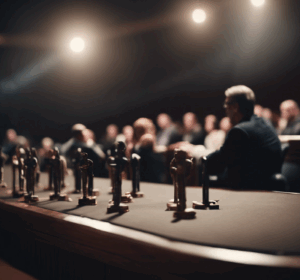
In an unexpected turn of events, the U.S. Copyright Office released a report on May 9, 2025, revealing that artificial intelligence (AI) companies were engaging in practices that breached copyright law. The findings suggest that large AI firms have been using copyrighted materials, such as books, images, music, and software, without the necessary permissions for training their models. The following day, Shira Perlmutter, the head of the U.S. Copyright Office, was suddenly dismissed from her post by the Trump administration.
This article examines the findings of the U.S. Copyright Office’s report on AI copyright violations, the political backdrop surrounding the abrupt dismissal of its chief, and the wider implications for the future of intellectual property rights in the age of AI.
The U.S. Copyright Office’s Report: Key Findings on AI and Copyright
The Grey Area of AI and Copyright
The Copyright Office’s report emphasizes the complex and often murky legal terrain where AI development and copyright law intersect. For years, tech companies have trained artificial intelligence models, such as GPT, DALL·E, and Claude, by scraping vast datasets from the internet. These datasets often contain copyrighted materials, such as books, images, music, and software code, that are used without the consent of the original creators.
While some AI companies argue that their use of such data falls under the legal doctrine of “fair use,” the report raises significant questions about whether this is the case for all forms of AI training. Fair use allows for limited use of copyrighted materials under specific circumstances, such as for criticism, commentary, research, or education. However, the Copyright Office concluded that not all AI training activities would qualify under these provisions, especially when the AI-generated outputs directly compete with or replicate copyrighted content.
Fair Use: Not a Catch-All Defense
The report challenges the widely held belief that AI companies can automatically justify their use of copyrighted works as fair use. In particular, the Copyright Office noted that while certain uses of copyrighted material may be protected under fair use when they are non-commercial, training AI models for commercial purposes—especially when the AI outputs substitute for the original works—could be seen as infringement.
The report states:
“Training AI systems on copyrighted works may be lawful in specific educational or research contexts, but using those models to create commercially viable products that compete with the original works is unlikely to be deemed fair use.”
This finding puts to rest the argument that using copyrighted works for AI training is equivalent to human learning or research. The Copyright Office’s clear stance is that commercial AI outputs, which mimic or replicate copyrighted works, are likely to infringe upon copyright protections.
The Sudden Firing of Shira Perlmutter: What Happened?
Timeline of Events
On May 9, 2025, the U.S. Copyright Office released its much-anticipated report on AI and copyright. The findings quickly stirred up legal and technological communities, and the following day, May 10, 2025, Shira Perlmutter, the Register of Copyrights, was unexpectedly dismissed from her position by President Donald Trump.
Perlmutter’s firing has raised eyebrows, particularly because of the timing. The Copyright Office’s findings had challenged powerful AI firms, and critics are questioning whether political pressures influenced the sudden removal of Perlmutter. There is little official explanation from the White House about the reasons behind the decision, but sources within the Copyright Office and Library of Congress have suggested that Perlmutter’s removal was entirely unexpected by her colleagues.
Political Implications: Was It a Coincidence?
Perlmutter’s dismissal has sparked heated discussions about the potential political motives behind it. One theory is that President Trump or members of his administration may have been influenced by corporate lobbying from the tech industry. In particular, high-profile figures like Elon Musk, whose company xAI is deeply involved in AI development, have been vocal opponents of strict intellectual property laws, particularly when they intersect with the future of AI.
Another point of contention is the fact that the dismissal of Perlmutter came just weeks after President Trump also dismissed Carla Hayden, the Librarian of Congress. These two high-profile leadership changes within the Library of Congress have raised concerns about the influence of corporate interests on the regulatory landscape.
Perlmutter had been seen as an advocate for protecting creators’ rights. Her removal has led many to believe that her stance on AI copyright violations may have played a role in her firing. Critics argue that the dismissal was politically motivated to undermine a critical and independent voice within the Copyright Office.
Reaction from Lawmakers, Creators, and Advocacy Groups
Bipartisan Criticism
Perlmutter’s firing was met with strong bipartisan backlash. Legislators from both sides of the political spectrum condemned the move as a politically motivated attack on the Copyright Office’s independence. Representative Joe Morelle (D-NY) called the dismissal an “unprecedented power grab” and warned that it could undermine the credibility of the agency responsible for safeguarding intellectual property in the U.S.
Morelle’s concerns were echoed by other lawmakers, including Representative Steve Scalise (R-LA), who also expressed alarm about the growing influence of corporate interests over federal policy. Lawmakers from both parties have demanded an investigation into the circumstances surrounding Perlmutter’s firing, though no formal inquiry has been launched.
Support from Creators and Advocacy Groups
Artists’ unions, advocacy groups, and independent creators have also voiced their concerns over the firing of Perlmutter and the potential implications for intellectual property rights. The American Federation of Musicians (AFM), the Writers Guild of America (WGA), and several independent artists’ coalitions have expressed concern that the removal of Perlmutter will embolden AI companies to continue using copyrighted works without compensation.
The Artists’ Rights Alliance issued a statement that said,
“This abrupt firing sends a dangerous message that corporate interests can override the protections established to safeguard the livelihoods of creators. Shira Perlmutter was a strong advocate for artists’ rights, and her removal jeopardizes the future of creative work in the AI era.”
AI Companies in the Spotlight: Who’s at Risk?
Who is Affected by Copyright Violations?
Although the Copyright Office’s report did not explicitly name specific AI companies, it referred to large-scale AI developers that utilize massive internet datasets containing copyrighted materials. The report highlighted the fact that major players in the AI space are likely at risk of facing legal action for copyright infringement. Some of the companies most likely to be impacted include:
-
OpenAI (GPT, DALL·E)
-
Google DeepMind
-
Meta (LLaMA)
-
Anthropic (Claude)
-
Stability AI (Stable Diffusion)
These companies, which have been at the forefront of AI development, rely on vast amounts of data scraped from the internet to train their models. While some of this data may be publicly available or within the public domain, much of it consists of copyrighted materials.
What Could Happen Next?
With the Copyright Office’s report now public, AI companies face increased scrutiny and potential legal challenges. Several lawsuits, including those from comedian Sarah Silverman and image library Getty Images, are already challenging AI firms over the unauthorized use of their copyrighted works.
These lawsuits have the potential to reshape how AI companies operate, especially if courts rule that these companies are liable for copyright infringement. As AI-generated content becomes more commercially viable, the legal and regulatory frameworks surrounding AI and copyright are likely to evolve rapidly.
Solutions for a Balanced Future: What Can Be Done?
Developing Clearer Policies for AI and Copyright
In the wake of these findings, policymakers and AI developers must work together to establish clearer guidelines on the use of copyrighted materials in AI training. Lawmakers should consider implementing legislation that requires AI companies to obtain licenses or permissions for using copyrighted content, especially when it is used for commercial purposes.
One potential solution could be the creation of a licensing framework that would allow AI companies to pay for access to copyrighted works in a way that ensures fair compensation for creators.
Transparency and Accountability
AI companies must also be more transparent about the data used to train their models. By disclosing the sources of their training materials, companies can provide more clarity to creators and the public about how their work is being used. Additionally, clearer accountability measures will ensure that AI companies are held responsible for any violations of copyright law.
Fair Use and Licensing
The concept of fair use needs to be revisited in light of the evolving role of AI in content creation. A more nuanced definition of fair use that takes into account the scale and purpose of AI training could provide greater legal clarity. Additionally, standardized licensing agreements between AI companies and content creators could provide a fairer and more sustainable model for using copyrighted works.
The recent report from the U.S. Copyright Office and the subsequent firing of Shira Perlmutter have raised important questions about the future of copyright law in the age of artificial intelligence. While AI has the potential to revolutionize many industries, it also poses significant challenges to the protections that intellectual property law provides to creators.
As AI continues to evolve, it is crucial for lawmakers, technologists, and creators to collaborate on developing policies that balance innovation with the protection of creative rights. Whether through new licensing frameworks, clearer definitions of fair use, or increased transparency, the future of AI and copyright depends on the ability to navigate these complex legal and ethical challenges.
Feel free to check out our other website at : https://synergypublish.com



